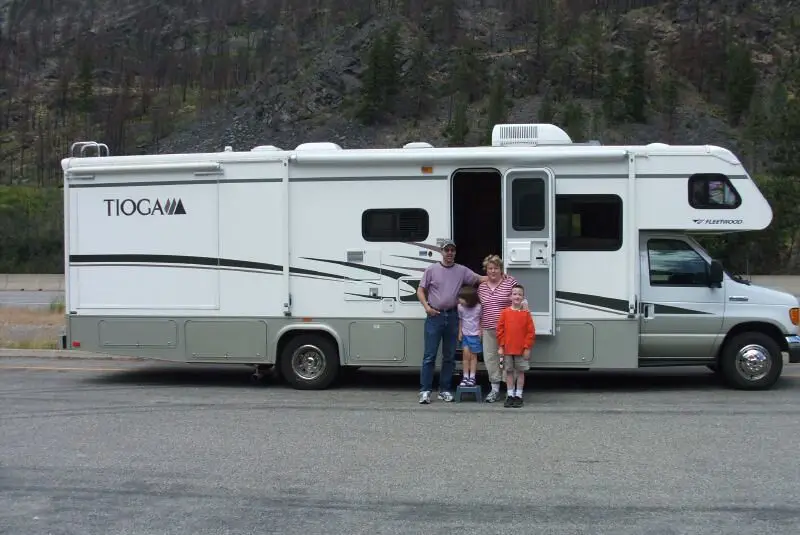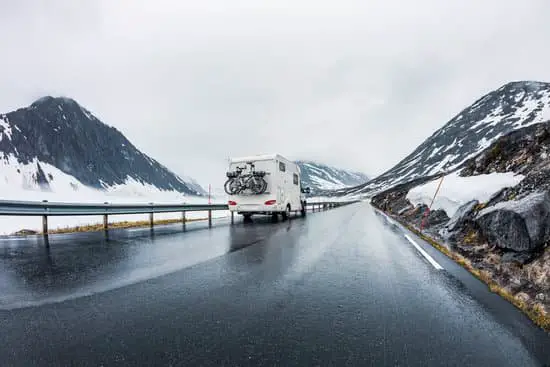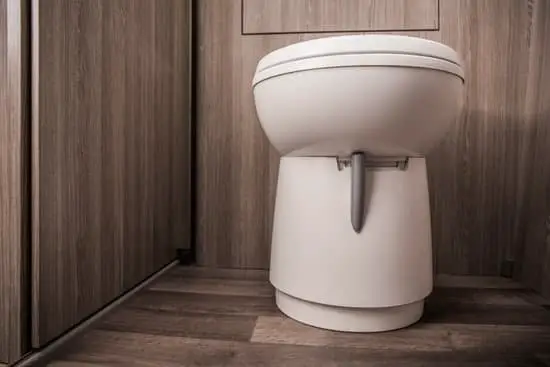Winterizing your RV is a long process that requires a lot of work and effort to ensure that you are properly prepared for the cold winter months. One major consideration when winterizing your vehicle is the size of the air compressor you need. This article will address what makes an appropriate size, why it matters, and what may happen if you don’t have enough airflow (among other things).
The primary considerations when choosing a compressor for winterizing your RV water system are the tank size, the CFM of airflow, and how long it will take to finish winterizing your RV. Naturally, the larger the air compressor you’re using for this process, the more time required.
A compressor that is too small may result in the water system taking hours longer to purge, which can lead to frozen pipes bursting from freezing temperatures outside (if you’re not using an anti-freeze solution)
The recommended air compressor size for winterizing an RV is a minimum of a one-gallon tank that will deliver at least 0.50 CFM (cubic feet per minute) of airflow, with larger tanks and a higher flow rate is preferred if you have the space available.
- Airflow is a significant factor when using compressed air to purge your RV water system for winterizing.
- A rule of thumb from most manufacturers recommends at least a four-gallon tank size for a family of two or three and at least six gallons for five to seven people.
- If you’re not using an anti-freeze solution as part of the purging process, a compressor that is too small may result in the water system taking hours longer to purge, which can lead to frozen pipes bursting from freezing temperatures outside.
- The best practice for winterizing your RV with an air compressor is as follows:
- Make sure that you have enough space for the size of compressor you need before purchasing one. If not, buy something smaller and save some money on storage or rent temporary space if necessary until you’re ready to make other changes (e.g., adding more insulation).
- Choose an appropriate tank size based on how many people will be using it and what type of fuel source it requires. For example, a gas-powered compressor uses larger tanks than diesel ones because they operate differently.
How big is an air compressor to winterize an RV?
For winterizing RVs, a minimum of 1-gallon tanks is required. This will ensure that the compressor can deliver at least 0.
5 CFM airflow
Compressed air is used to purge your water system.
What PSI is required to winterize my camper
However, you will need to winterize your RV with air volume and not pressure.
The pressure you should be used to blow out your pipes is 35-50 psi. Anything higher can cause plumbing damage.
How big of an air compressor is required to inflate RV tires?
The average RV tire needs 35 to 80 PSI. Therefore, you will need an air compressor capable of delivering pressure in this range to fill your tires.
Will holding tanks freeze?
Your holding tanks’ placement will impact their susceptibility to freezing.
Tanks that are higher than the floor (as is often the case with Class B motor-homes and conversion vans) will likely not freeze because of the heat in your RV.
How Large Is An Air Compressor to Winterize a Vehicle? – Similar Questions
Can I dump RV antifreeze onto the ground?
Even if RV antifreeze is safe and non-toxic, you should not leave it on the ground.
It is a chemical substance that can still be used so that RV antifreeze can endanger the environment at many levels.
Some materials used to make RV antifreeze can also be flammable.
How can you winterize your RV without using antifreeze?
Simply blowing out the water system with compressed air can be enough to winterize an RV. It is much easier to use compressed air to blow out the system. Two things are needed here: an air compressor and a “blow out plug.”
Which is the best compressor for air tires?
- Overall, Viair 40047 400P Portable Compressor kit for air compressors
- Best 12 Volt Compressor: TIRE WELL 12-V 150PSI Tire Inflator
- Portable RV Air Compressors: PORTER-CABLE (CMB15). Portable Air Compressor kit.
- Best Off-Road Air Compressor: The GSPSCN Double Cylinders Portable Air Compressor.
Which portable air compressor is the best?
- BEST OVERALL: Makita MACC2400 Big Bore 2.Air Compressor with 5 HP.
- BEST BANG FOR THE Buck: Senco PC1010 1-Horsepower 1-Gallon Compressor.
- BEST COMPACT: Metabo HPT Compressor 1-Gallon EEC28M
- BEST LARGE CAPACITY: WEN 2220 20-Gallon Portable Air Compressor.
- BEST WITH WHEELS – California Air Tools 8010A Air Compressor.
How do you inflate tires?
For dual tires, you will need to access the inner valve stem with or without an extender. Attach the chuck to this stem and then use an air compressor that has a high PSI rating. A blowout is a great way to ruin your RV trip.
How can you keep a holding tank from freezing?
The following five steps are recommended: 1) Install a thermostat-controlled personal space heater in your wet bay; 2) Fill the freshwater tank to the brim with water; 3) Add antifreeze to grey and black tanks as needed. 4) Keep the sewer hose elevated above the ground to prevent damage to RV pipes. 5)
How do I defrost my RV black tank?
To slowly warm up the RV holding tank, use a blow dryer. First, keep the blower at least six to twelve inches away from your tank. Then, slowly move the blow dryer across the entire tank. Repeat this several times to release the tank from freezing.
How do I keep my RV’s toilet from freezing?
- Begin with an empty black water tank. Then, add 3-4 gallons (or more) of RV antifreeze.
- Then flush the toilet using the RV antifreeze as needed.
- After you’re done using it, dump the contents as usual.
How many gallons of RV antifreeze is needed to winterize a camper?
You will need 2 to 3 gallons of RV antifreeze, depending on the size and configuration of your rig.
What is the average time it takes for RV pipes to freeze?
About 24 hours
Your RV pipes will freeze faster if the temperature drops to below freezing. For example, your pipes will freeze in 24 hours if your temperature drops to freezing.
Is it possible to put antifreeze in an RV black tank
you can use antifreeze to protect your holding tanks in cold weather? r.
yo, can purchase non-toxic antifreeze for RVs.
Pour a few quarts of black water into your holding tank and flush it down the toilet.
Will pipes freeze when temperatures reach 29 degrees?
Your pipes freeze in the winter when it is outside temperatures are below 20 degrees Fahrenheit. This depends on where you live. The pipes inside your home are more insulated in areas with lower temperatures than those in other regions.
What is the minimum temperature that can keep pipes from freezing?
Around 20 degrees Fahrenheit
The minimum temperature to keep pipes from freezing
How can RV antifreeze be neutralized?
After flushing your water system for a few minutes, it should smell clean and fresh. If your water has a residual antifreeze flavor, you can add baking powder to get rid of this. Sprinkle baking soda directly in each drain, or mix it with water and pour it down.






